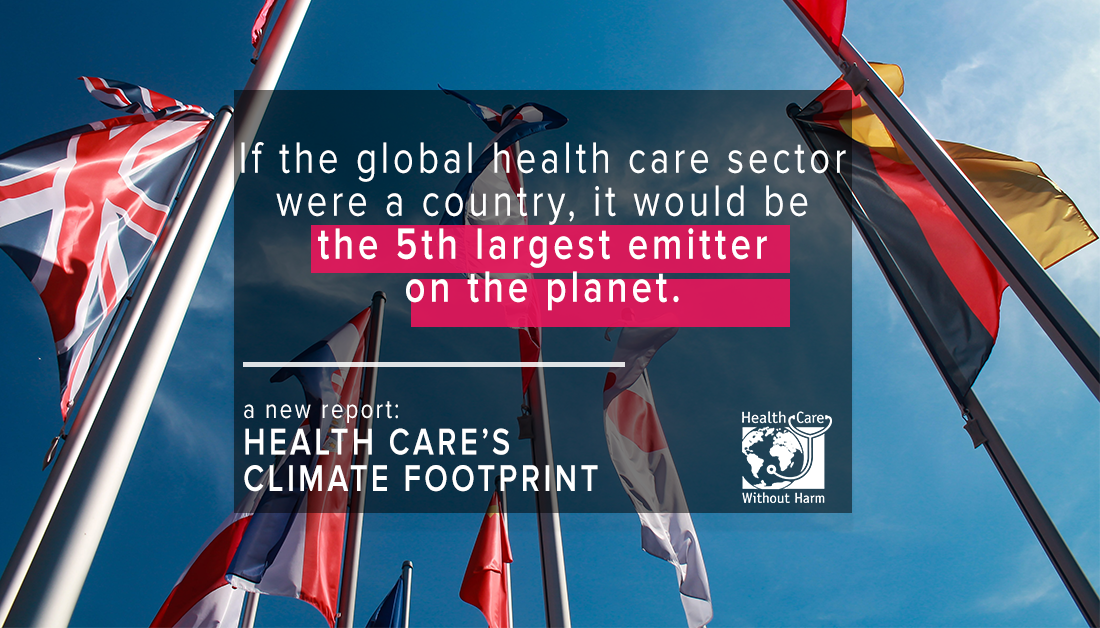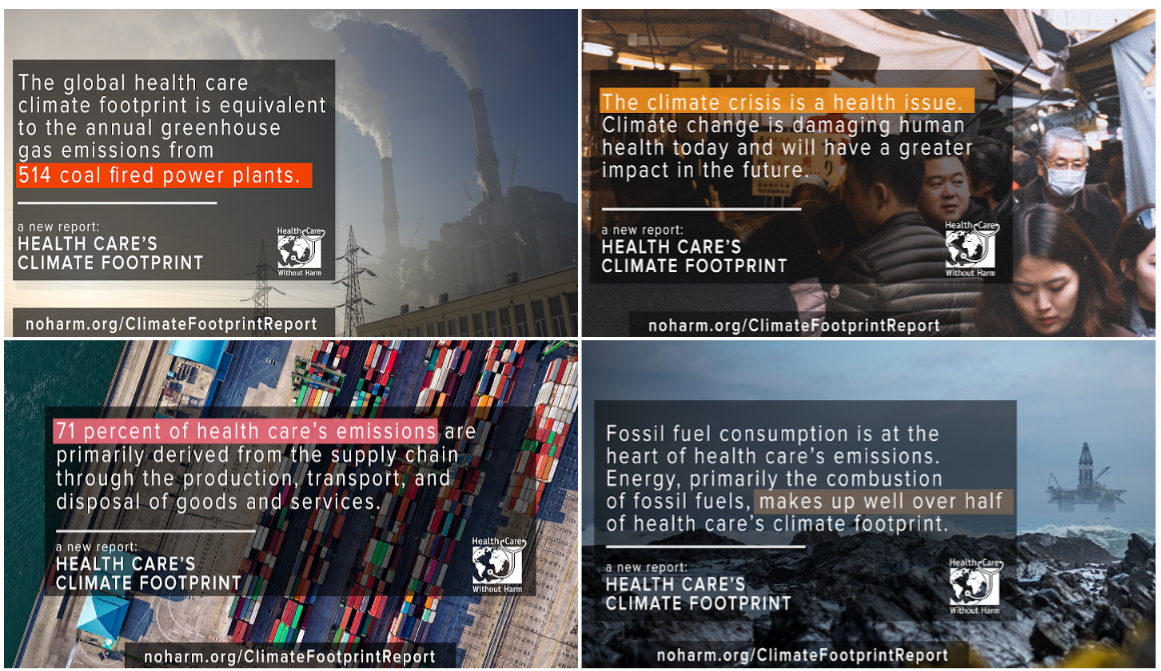New report provides first-ever estimate of health care’s global climate footprint, calls for zero emissions.
I
f the global health care sector were a country, it would be the fifth-largest greenhouse gas emitter on the planet, according to Health care’s climate footprint: How the health sector contributes to the global climate crisis and opportunities for action, a new report by Health Care Without Harm in collaboration with Arup.Establishing the first-ever estimate of health care’s global climate footprint, the report finds health care’s footprint is equivalent to 4.4% of global net emissions (2 gigatons of carbon dioxide equivalent). Fossil fuel combustion makes up well over half of health care’s global climate footprint. The top three emitters, the United States, China, and collectively the countries of the European Union, comprise more than half the world’s total health care climate footprint (56%). While India has the seventh-largest absolute health sector climate footprint, it has the lowest health-related emissions per capita of all 43 nations considered in detail in this study.
Dr. Srinath Reddy, President, Public Health Foundation of India says, “As human health and even survival are threatened as never before by climate change, the health sector has not only to be the conscience keeper but also the pacesetter for mitigation and adaptation. By adopting green technologies, reducing emissions and moving to green procurement practices, the health sector can support mitigation. It should also build climate resilient health care systems which can withstand the challenges of climate change and provide dependable services even in the face of climate change –related disasters and health hazards.”
The report, released simultaneously at events in London and Medellin, Colombia, makes the case for a transformation of the health care sector that aligns it with the Paris Agreement goal of limiting climate change to 1.5 degrees celsius.
“Not only are doctors, nurses and health facilities all first responders to the impacts of climate change, but hospitals and health care systems paradoxically make a major contribution to the climate crisis,” says Josh Karliner, International Director of Program and Strategy for Health Care Without Harm and one of the authors of the report. “The health sector needs to transition to clean, renewable energy and deploy other primary prevention strategies to achieve net zero greenhouse gas emissions by 2050. Health care has to step up and do its part to avoid catastrophic climate change, which would be devastating to human health worldwide.”
Hospitals, health systems and their supply chains in the United States, China, and collectively the countries of the European Union, comprise more than half of health care’s worldwide emissions. And while vastly differing in scale, every nation’s health sector directly and indirectly releases greenhouse gases as it delivers care. India’s healthcare system is poised to expand exponentially. This is the opportunity for the country to develop and transition towards a zero emissions’ healthcare sector.
Dr. Alex Thomas, President at Association of Healthcare Providers - India and President at Association of National Board of Accredited Institutions says, "Though India ranks the lowest in Health-related emissions per capita [0.03 metric tons], its global contribution is at par with countries like Australia, Canada and South Korea. Compared to these countries, India is more vulnerable to looming climate change impacts and this could imminently impact our climate footprint as well reverse or stall decades of progress we have made in public health. The state of Chhattisgarh has showed us how roof-top solar PV systems in PHCs can help reduce carbon emission, eliminate inefficiency as well as be a reliable power source during extreme weather events. The remaining states in our country should also follow suit, aiming at zero carbon emissions for a healthy planet. Furthermore, our public and private hospitals should also pursue climate smart strategies to not only be ready at all times to combat eventualities but also not be a contributor to climate change in any way."
“Health sector facilities are the operational heart of service delivery, protecting health, treating patients, and saving lives. Yet health sector facilities are also a source of carbon emissions, contributing to climate change. Places of healing should be leading the way, not contributing to the burden of disease,” says Tedros Adhanom Ghebreyesus, Director General of the World Health Organization.
The report calls for a global roadmap for climate-smart health care in order to reduce emissions, while meeting goals such as universal health coverage. The report also outlines immediate actions that stakeholders from across the health sector should take, including:
- Individual hospitals and independent health systems should follow the example of thousands of hospitals already moving toward climate-smart health care via Health Care Without Harm’s Health Care Climate Challenge and other initiatives.
- National and subnational governments should build on existing initiatives to establish action plans to decarbonize their health systems, foster resilience, and improve health outcomes.
- Bilateral aid agencies, multilateral development banks, other health funding agencies and philanthropies should integrate climate-smart principles and strategies into their health aid, lending, and policy guidance for developing countries.
The report concludes that health promotion, disease prevention, universal health coverage, and the global climate goal of net zero emissions must become intertwined.
“The health sector must become climate-smart,” says Gary Cohen, founder of Health Care Without Harm. “Both climate justice and health equity depend on it.”
The report will be released on Sept. 10. Held at the Wellcome Trust, the London launch event will include a high-level panel moderated by Howard Frumkin, Head of Our Planet Our Health at the Wellcome Trust. Panelists will include Mandeep Daliwhal, Director of UNDP's HIV, Health, and Development Group as well as representatives from WHO, NHS, Health Care Without Harm, and Arup. The report will also be showcased at the Climate and Health Conference in Medellín, Columbia, which will feature Health Care Without Harm, city officials, the provincial government of Antioquia, PAHO/WHO, and Antioquia University.
The full report can be downloaded from: www.noharm.org/ClimateFootprintReport
About Health Care Without Harm
Heath Care Without Harm works to transform the health sector worldwide, without compromising patient safety or care, so that it becomes ecologically sustainable and a leading advocate for environmental health and justice.
Contact: Gunjan Jain - gunjan.jain@gsccnetwork.org // +91 9811777387
###
Easily amplify the key findings and action items of the report using our social media guide which includes example posts and images free for you to share.

